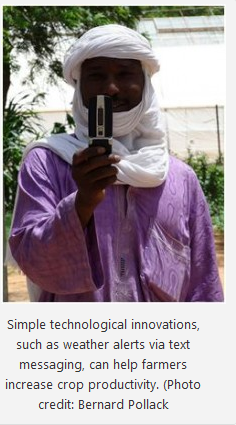 Recent spikes in food prices around the world–and the unrest in the Middle East and North Africa–have sparked fears of a repeat of the 2008 food crisis. To find ways to help address these issues, the World Bank’s Agriculture and Rural Development division recently held events focusing on Understanding Volatility and Managing Risk.
Recent spikes in food prices around the world–and the unrest in the Middle East and North Africa–have sparked fears of a repeat of the 2008 food crisis. To find ways to help address these issues, the World Bank’s Agriculture and Rural Development division recently held events focusing on Understanding Volatility and Managing Risk.
One of the events,“Non-traditional Approaches to Addressing Risk and Vulnerability inAgriculture,” looked atinnovative projects in Turkey and Kyrgyzstan that are addressing production risks and the vulnerability of agriculture because of changes in theclimate. Senior Rural Development Specialist of the Europe and Central Asia Region, Talaibek Torokulovich Koshmatov, provided insight on how cell phones are providing weather alerts to farmers in both those countries.
In Turkey, the Agricultural Directorate installed five meteorological stations to gather information about pest control and frost prevention and then send that information to farmers via cell phones. Scientists were able to determine the nesting periods of pests by setting up pest traps and regularly monitoring temperatures. With this knowledge, they were able to send out alerts to farmers before the peak pest seasons, enabling farmers to know the most effective time to apply pesticides to their fields. Thanks to this new technology, farmers were able to reduce their pesticide application from six to three times a year – reducing their costs and increasing their yields, while also protecting the environment.
Using this same sort of cell phone technology, Turkish farmers were also able to reduce their harvest loss to early spring frost, which is frequent in Turkey. The stations monitor temperatures on an hourly basis and send out text message alerts to farmers that warn them of oncoming frost. Farmers can then take preventive measures, such as burning old leaves, to warm their fields and protect their crops from frost.
Koshmatov’s team used these simple and low-tech solutions and worked to replicate them in Kyrgyzstan. Since Kyrgyzstan lacks the advanced meteorological services that Turkey has, the team relied on freely available global forecasts from the United States National Oceanic and Atmospheric Administration (NOAA) which provided free information on village level temperatures to anyone who had access to the internet. Even though these forecasts were not extremely precise, they provided farmers with enough information to plan ahead and take preventive action, such as the timely application of pesticides, to protect their crops.
But not all farmers in Kyrgyzstan have Internet access. As a result, Koshmatov is working with the Norwegian Meteorological Institute and the Norwegian Broadcasting Corporation to distribute forecasts to farmers for just $ 0.5, providing information that allows them to plan their planting seasons according to the weather.
Koshmatov and his team are continuing improve the project – they are currently talking to cell phone operators to make this service accessible to rural farmers all over the country.
Supriya Kumar is a Communications Associate with the Nourishing the Planet project.

Danielle Nierenberg, an expert on livestock and sustainability, currently serves as Project Director of State of World 2011 for the Worldwatch Institute, a Washington, DC-based environmental think tank. Her knowledge of factory farming and its global spread and sustainable agriculture has been cited widely in the New York Times Magazine, the International Herald Tribune, the Washington Post, and
other publications.
Danielle worked for two years as a Peace Corps volunteer in the Dominican Republic. She is currently traveling across Africa looking at innovations that are working to alleviate hunger and poverty and blogging everyday at Worldwatch Institute’s Nourishing the Planet. She has a regular column with the Mail & Guardian, the Kansas City Star, and the Huffington Post and her writing was been featured in newspapers across Africa including the Cape Town Argus, the Zambia Daily Mail, Coast Week (Kenya), and other African publications. She holds an M.S. in agriculture, food, and environment from Tufts University and a B.A. in environmental policy from Monmouth College.








